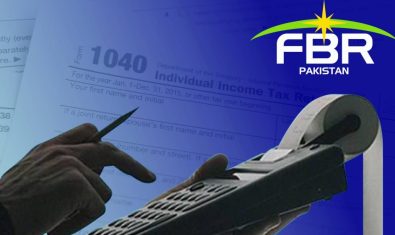Every Pakistani citizen has at some point in their lives have encountered red tape in government offices, which makes them bang their heads against the wall.
The illogical and redundant rules followed and implemented by Pakistan’s so-called competent bureaucracy are frequently seen as making simple processes more complicated.
The Twisted Web of Passport Procedures
The Directorate General of Immigration and Passports (DGIP) is no different. This organization, which is supposed to issue passports and make the immigration process easier, is actually making these two processes quite difficult.
Different Address? No Passport For You
To apply for or renew a passport, there’s a rule that may seem illogical to many. This rule requires that one or both of the addresses listed on your CNIC must be the same as the address of the Passport Office center where you’re making the application.
This means that even if you’re eligible in all other respects, you could face illogical hindrances if your CNIC’s address does not match the specified Passport Office’s address.
Many people from other cities live in metropolitan areas like Islamabad, Lahore, and Karachi. However, these “outsiders” cannot renew or apply for a new passport in these cities if their CNICs do not have an address in one of these cities.
One may wonder why these individuals do not change their temporary address when they are residing in these cities. The answer is that most of these individuals rent hostels, rooms, or apartments when working in these cities, and it becomes inconvenient to keep changing their temporary address every time they move to a different city or house.
For example, in Germany, to apply for a passport (Reisepass beantragen), one needs to book an appointment at the citizens’ office (Bürgeramt) in the municipality where they are registered. One can also apply at citizens’ offices in other municipalities, but they will need to pay an additional fee.
DGIP can adopt such a system in Pakistan in order to allow citizens to renew or apply for a passport at any of the cities despite having different addresses on CNIC.
DGIP’s Online Service: Innovation or More Red Tape?
Although DGIP has introduced an online service for the issuance of passports, making Pakistan one of the few countries to do so.
However, this service is riddled with red tape as well. The easiest way to submit fingerprints could be via one’s smartphone, which comes with required security features keeping in view the banking apps being used on phones.
On the other hand, the DGIP’s passport portal requires applicants to print out a fingerprint form to submit and verify their biometrics. However, this is not the only step involved, as applicants must also ensure that their fingerprints are “crystal clear” in order for their application to be approved. This does not end here.
Unending Red Tape: DGIP’s Fingerprint Fiasco
Also, the fingerprint form must be scanned at 600 dpi, and only then will the system proceed to the next step. Most people do not even have a scanner at home. So even an online service requires you to keep going to your nearby printing shop until your fingerprints match on DGIP’s system.
After all of these processes, if your fingerprints do not match due to being unclear or any other issue. Applicants must go through this process once again. On top of that, DGIP has mentioned on its portal that they may call any applicant for an “interview” as well. One way or another, Pakistani citizens cannot simply avoid red tape.
Gender Bias?
Earlier, the Lahore High Court (LHC) instructed the federal government, DGIP, and NADRA, about another rule that says married women need their husband’s name on their CNICs to get passports.
Khadija Shah, a lawyer, was denied a passport renewal at the LHC’s passport office because her ID card listed her father’s name in the “daughter of” section instead of her husband’s name in the “wife of” section.
Khadija stated that she had already updated her marital status with NADRA. She contended that NADRA allows married women to keep their father’s name on their ID cards.
However, the passport office informed her otherwise. They said that a woman’s ID card must have her husband’s name on it in order to get a passport. Khadija argued that this rule is not fair and goes against the law. She stated that the passport office cannot just make up rules, stressing that everyone should follow the law.
Khadija also mentioned that this policy of the passport office violates articles 8(1) and 25 of the Constitution.
Economic Implications of DGIP’s Approach
It is beyond comprehension why DGIP does not utilize its centralized system similar to NADRA instead of creating problems for nationals, who can potentially send billions in remittances. It means that DGIP is not only complicating the immigration process but also preventing Pakistan from achieving its true remittance potential.
Pakistan’s top officials who keep flying to first-world countries for official visits do not learn from the governing systems of those countries, which make their people’s lives easier.
Systemic Flaws: More than Just Procedures
In addition to procedural issues, Passport Offices across the country are also plagued by poor infrastructure, one of the worst queuing systems, and untrained staff, all of which contribute to the problem.
A huge number of people have moved out of the country, with 832,000 in 2022, and 540,000 so far in 2023. In total 1.37 million have moved to other countries in the last two years, according to recent data.
As many people flock to passport offices, the issuance time of passports has also increased. Normal delivery, which was supposed to take 15 days, now takes 30 days, whereas DGIP has failed to expand its workforce to cater to rising demand.






















And, they mention 15 days process on your token but you can’t receive it before 30 days.
Bhai, they do this on purpose, and to charge extra from citizens. There are agents in each and every office of theirs, who will get your passports issued without any such requirements against a FEE, which is equally shared among the officials.
So if you want to get your passport, even if your address is from a different city / district, there are agents who can get this done for you, just pay a few thousands and duh, all done.
High ups are aware of all this, but will let this happen coz of the share they get ;)
Forcing women to remove their father’s name is not only illegal in Pakistani law but also illegal in Islamic law. Nadra has no such requirement to change to husband’s name. Not sure why Passport office has this.
The shittiest government in the entire world. Even Congo is better than Faujistan.
I totally agree with you on all these hindrances a citizen has to go through, specifically that’s totally absurd for the online finger printing requirements they have mentioned on their site, it can easily be done through finger scanner of one’s mobile phone as you’ve mentioned.
You forget to mention, sometimes is just the foreingh country itself who just dosn’t want to accept people visa.